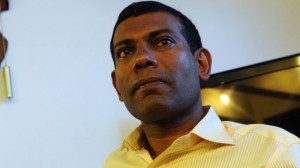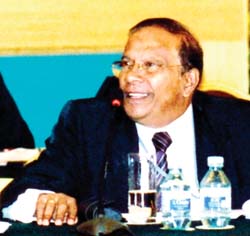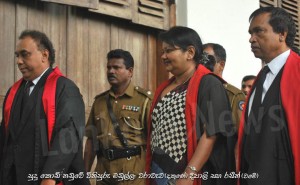Political Interference with Judicial Independence- Lessons from the Maldivian Experience
He is not just if he decides a case arbitrarily, the wise man should decide after considering both what is right and what is wrong –The Dhammapada-Justice
It was reported in the media recently that the Maldivian President had resigned following events that took place in the Maldives subsequent to the arrest by the

Former Maldivian President Mohamed Nasheed speaks to reporters at his residence in the capital island Male on February 9, 2012. Photo taken from presstv
Maldivian army of a senior judge in the criminal court in Maldives for alleged corruption, on the orders of the President. A government statement said the judge, Abdulla Mohamed, had allowed “his judicial decisions to be determined by political and personal affiliations”.
Detained for defaming the government
The arrest comes after the judge released an opposition leader who had been detained for allegedly defaming the government. Judge Mohamed has made no comment on his arrest as yet. Opposition activists said that the arrest was in retaliation for the judge ruling that the detention of opposition leader Mohamed Jameel Ahmed one day earlier was illegal, AP news agency reported. Mr Ahmed had been arrested for allegedly defaming the government in a television interview. The supreme court, the prosecutor general’s office and judicial services commission have demanded Judge Mohamed’s release, calling his arrest illegal. The government statement accused Judge Mohamed of failing to respect the principle of judicial independence and also refers to him “repeatedly releasing opposition figures brought before the courts for serious crimes”. A source in the government claimed Judge Mohamed was deliberately obstructing cases involving members of opposition parties. Gassan Maumoon, the son of the former President Maumoon Abdul Gayoom, was also reportedly released after Judge Mohamed intervened in the case in November, last year, ruling that he was unlawfully detained. Mr Maumoon was arrested on charges of attempted murder after allegedly throwing a wooden plank at protesters during a demonstration. Local media reports say all court hearings had been suspended in the wake of the arrest.
Ranil alleges judge harassed after acquitting Fonseka
In Sri Lanka, the media recently reported that Opposition United National Party (UNP) leader Ranil Wickremesinghe alleged that High Court Judge W.T.M.P.B.
Warawewa, who acquitted former Army Commander Sarath Fonseka of all charges in the white flag case, is being harassed, Mr. Wickremesinghe told a public meeting at Dematagoda that Justice Warawewa’s computer had been damaged soon after he gave his verdict. He said his party would raise this matter in parliament. “We will take this up in parliament because it is the highest authority and exercises its legislative powers through the judiciary,” Mr. Wickremesinghe said and added that Justice Warawewa was not allowed to read out his verdict in Court. He said the usual tradition followed in the courts was to read out the verdicts when the Bench was divided but in this instance this tradition was not followed in the High Court.
Judicial independence and judicial bias’
Recently it was reported in the Sunday Times (05th February 2012) in an article titled ‘Judicial independence and judicial bias’ by Nihal Sri Ameresekere, Public Interest Activist and Associate Member, American Bar Association that High Court Judge W.T.M.P.B. Warawewa was reported to have, inter-alia, pronounced:
“Judges need to comprehend the moral implications of their verdicts and deliver verdicts that are in accordance with their conscience. They need not dispense justice in fear; the doors of hell are open to Judges who deliver verdicts based on what they can get out of it; similarly those gates are closed to Judges who sentence justly. …..Some Judges or politicians make decisions based on what gains it brings them. Judges should not be thinking about what promotions or perks they may lose while dispensing justice ….. Judges must adopt a middle path, things like perks and promotions should not be considerations for Judges when they are delivering verdicts.”
Fearless statement
This indeed is a fearless statement from a highly respected judge in the Sri Lankan judiciary, which epitomizes the hallowed principles of judicial independence and delivery of justice without fear or favour or bias. It is paramount that judges must act according to their conscience and as Jusrice Waraweva very correctly stated the judges who compromise their judgements for personal benefit or ill-gotten gains would undoubtedly enter the portals of hell. Sri Lankan society looks up to their judiciary with heart-felt respect as the great judges of yore had built up an impeccable reputation of honesty and integrity in the delivery of justice in our country.
Justice Ameer Ismail
It is an undisputed fact that former Chief Justice His Lordship Neville Samarakone did not permit his association with the then President J.R.Jatawardene who

"One morning the writer visited the chambers of His Lordship Ameer Ismail who was the President of the Court of Appeal at that time to present a copy of a book written by him on Administrative Law. The judge was standing up and praying with both his hands pointed upwards and after the prayers were concluded the writer presented the book and His Lordship said: “Every morning I pray to my God to grant divine guidance in order that I may deliver proper judgements in the cases that come before me.”" Photo shows Justice Ameer Ismail a retired Judge of the Supreme Court of Sri Lanka and a former Chairman of the Commission to Investigate Allegations of Bribery or Corruption, Sri Lanka
appointed His Lordship to the exalted position, to interfere with the impartiality of the judgements delivered for which His Lordship is remembered and revered for all time. A judge should never permit personal bias to interfere in the delivery of justice. One morning the writer visited the chambers of His Lordship Ameer Ismail who was the President of the Court of Appeal at that time to present a copy of a book written by him on Administrative Law. The judge was standing up and praying with both his hands pointed upwards and after the prayers were concluded the writer presented the book and His Lordship said: “Every morning I pray to my God to grant divine guidance in order that I may deliver proper judgements in the cases that come before me.”Such is the devotion to their sacred duty by our judges.
Assassination of Justice Sarath Ambepitiya
The politicians of our country should also take a lesson from what happened in Maldives recently to learn never to interfere with the independence of the judiciary. If a judge is not performing his functions properly there are procedures to be followed laid down in our Constitution for the removal of such a judge.. Sometime ago judges’ residences were stone by hooligans sent by politicians who did not approve of the judgements delivered. Violence should never be used as which occurred in the unfortunate assassination of Justice Sarath Ambepitiya who delivered justice without fear or favour.
Idi Amin
The murder of a former Chief Justice of Uganda on the orders of the maniac, then President of Uganda, Idi Amin for delivering justice according to His Lordship’s conscience and refusing to follow the orders of the President is a good example to indicate the extreme extent to which stupid persons intoxicated with political power could act thoughtlessly. Those in elevated positions of political power should realize that they hold such power as a public trust and that such power is not eternal. The day of reckoning will dawn on all such persons without a doubt whatsoever. Thus intimidation or corruption of the judiciary with the lure of promotions or personal gain, in whatever form should never be resorted to by people in power lest they be discarded by their own people as witnessed in Maldives recently. Great leaders of a Nation who wish to be remembered and honoured for the service rendered to their people would never follow such a demeaning path.
The writer is an Attorney-at-Law

